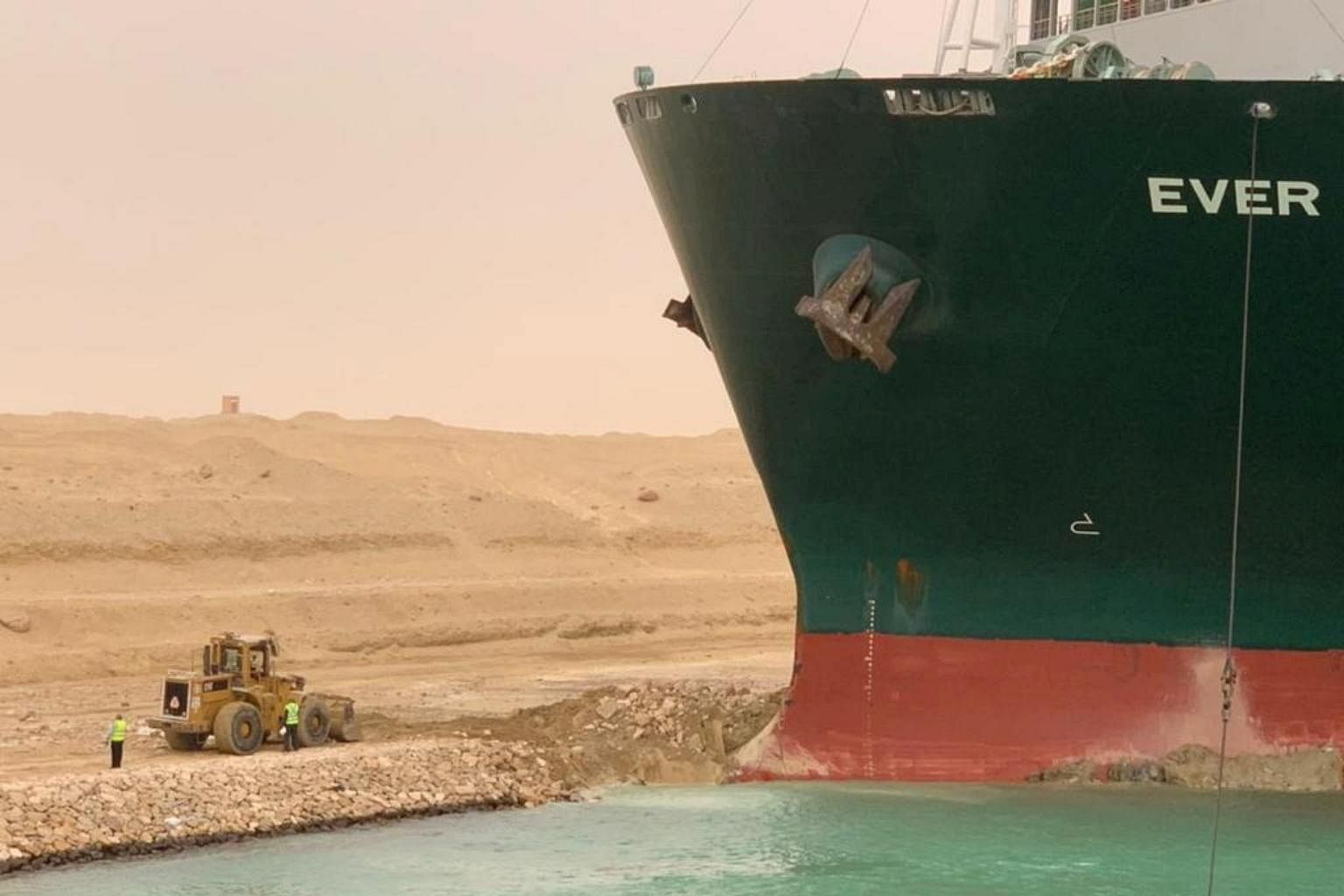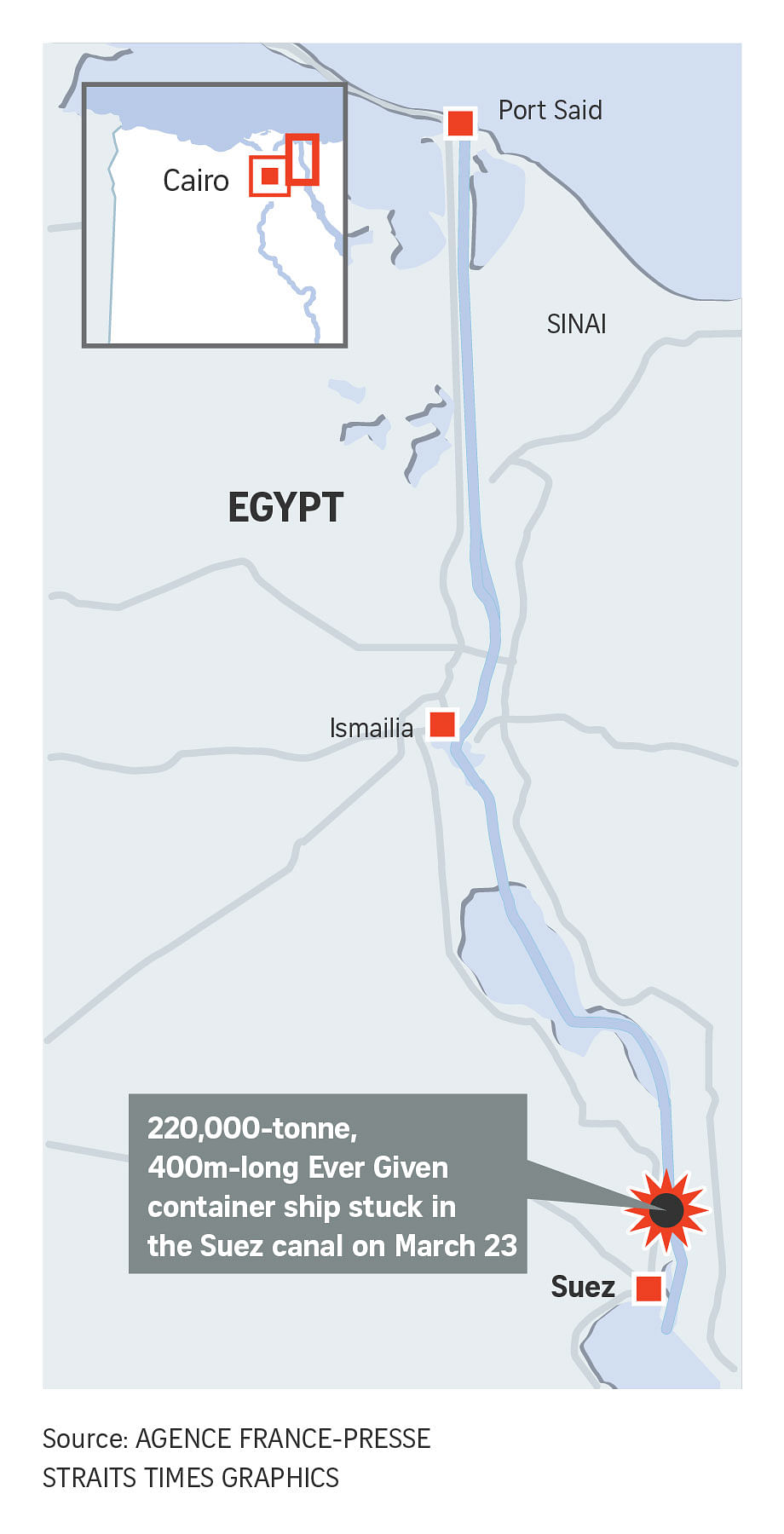Low tide slows work to clear Suez Canal ship blockage; traffic jam builds
Sign up now: Get ST's newsletters delivered to your inbox
CAIRO (REUTERS, BLOOMBERG) - Low tide overnight has slowed efforts to dislodge a massive container ship that has choked traffic in both directions along the Suez Canal and created the world's largest shipping jam.
The Ever Given vessel ran aground diagonally across the single-lane stretch of the southern canal on Tuesday morning (March 23) after losing the ability to steer amid high winds and a dust storm, the Suez Canal Authority (SCA) said in a statement.
It is now blocking transit in both directions through one of the world's busiest shipping channels for goods, oil, grain and other products linking Asia and Europe.
On Wednesday, 185 vessels, mostly bulk carriers, container ships, and oil or chemical tankers were waiting to cross the canal, according to shipping data compiled by Bloomberg.
The canal is among the busiest waterways in the world, used by tankers shipping crude from the Middle East to Europe and North America, as well as in the opposite direction.
Roughly 30 per cent of the world's shipping container volume transits through the 193km Suez Canal daily, and about 12 per cent of total global trade of all goods.
For now, all that traffic is backed up, with the Ever Given aground in the southern part of the canal, creating another setback for global supply chains already strained by the e-commerce boom linked to the pandemic.
"The Suez Canal blockage comes at a particularly unhelpful time," said Mr Greg Knowler, European editor at JOC Group, which is part of IHS Markit. "Even a two-day delay would further add to the supply chain disruption slowing the delivery of cargo to businesses across the UK and Europe."
A rough estimate shows that the blockage is costing about US$400 million (S$539 million) an hour, based on calculations from Lloyd's List that suggest westbound traffic is worth around US$5.1 billion a day and eastbound traffic is approximately US$4.5 billion.

Efforts to refloat ship
Marine services firm GAC issued a note to clients overnight saying efforts to free the vessel using tug boats continued, but that wind conditions and the sheer size of the vessel "were hindering the operation".
Ship-tracking software shows that the Ever Given has made only minor changes to its position over the past 24 hours, despite the deployment of several tugs to drag it to deeper water.
Shipping experts say that if the blockage is not likely to be cleared within the next 24 to 48 hours, some shipping firms may be forced to re-route vessels around the southern tip of Africa, which would add roughly a week to the journey.
But the chairman of the Suez Canal Authority told media that despite the blockage, some cargo was able to move south and that efforts to dislodge Ever Given would continue.
Work to refloat the ship was suspended until Thursday morning in Egypt, shipping agent Inchcape said, citing the Suez Canal Authority. Dredgers are still trying to loosen the vessel before any attempt to pull it out, the ship's manager said.
The situation has become so desperate that an elite salvage squad from the Netherlands is due to arrive on Thursday to work on prising the Ever Given from the bank of the canal, where it is blocking ocean-going carriers that haul everything from oil to consumer goods
Still, the best chance for freeing the ship may not come until Sunday or Monday, when the tide will reach a peak that will add an extra 46cm in depth, allowing for more manoeuvring, said Mr Nick Sloane, the salvage master responsible for refloating the Costa Concordia, the cruise ship that capsized on the coast of Italy in 2012.
It is taxing to even grasp how big this ship is. About 400m-long and weighing in at 200,000 metric tonnes, its sheer size is overwhelming the efforts to dig it out. A huge yellow excavator, itself about twice as tall as its driver, looks like a speck next to the ship's bulking bow.
The international incident began on Tuesday when strong winds blasted through the region and kicked up sands along the banks of the 193km-long canal, which connects the Mediterranean in the north with the Red Sea in the south. The waterway is narrow, less than 205m in some places, and can be difficult to navigate when there is poor visibility.
But Ever Given stayed its course through the canal - on its way to Rotterdam from China. As gusts that reached as high as 74kmh swept up dust around it, the crew lost control of ship and it careened sideways into a sandy embankment, blocking nearly the entirety of the channel. It is still in the same position as when it ran aground, according to Inchcape.
At the heart of all of this is the ship's massive scale.
Container vessels have nearly doubled in size in the past decade as global trade expanded, making the job of moving such ships much harder when they get stuck.
Even while key routes - including the Suez Canal - have been widened and deepened over the years to accommodate the mega-sized vessels, the work to dig them out after they get stuck takes enormous power.
The struggle to dislodge the ship is now falling to SMIT Salvage, a legendary Dutch firm whose employees parachute themselves from one ship wreckage to the next, saving vessels often during violent storms. This ship is so heavy that the salvors may have to lighten it by removing things like the ballast water, which helps keep ships steady when they are at sea. Fuel could also be unloaded.

Industry risks
The blockage highlights a major risk faced by the shipping industry as more and more ships transit maritime choke points, including the Suez, Panama Canal, the Strait of Hormuz and South-east Asia's Malacca Strait. Such occurrences could become more common as ships get bigger and waterways get more congested.
Oil companies are starting to prepare for the worst.
On Wednesday, there was an uptick in interest from oil companies looking to book tankers with options to avoid the canal, according to a broker, and several bid for space on the pipelines that allow bypass of the waterway completely.
For now, that is a just-in-case move. Container ships will most likely have to wait it out, as the main alternative is the unattractive option of sailing around the southern tip of Africa.
The disruption comes at a time when oil prices were already volatile. Crude surged above US$70 a barrel earlier this month on Saudi production cuts, only to slump close to US$60 this week due to setbacks in Europe's coronavirus vaccine programme.
Brent crude rose more than 5 per cent on Wednesday.
Ever Given's crew members are safe and accounted for, and there have been no reports of injuries or pollution, according to the ship's manager, Bernhard Schulte Shipmanagement.
The vessel is carrying cargo for logistics company Orient Overseas Container Line (OOCL), according to Mr Mark Wong, a spokesman for OOCL.


